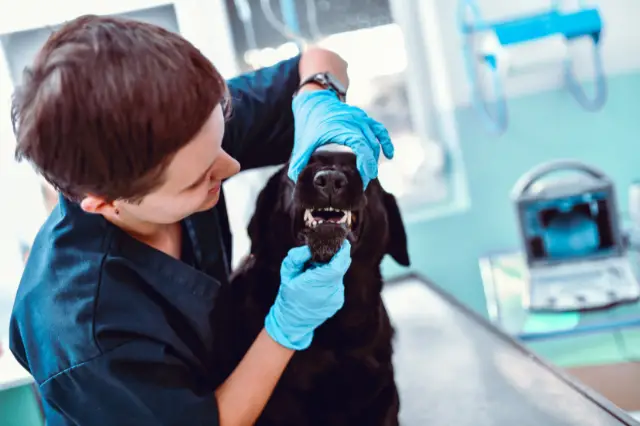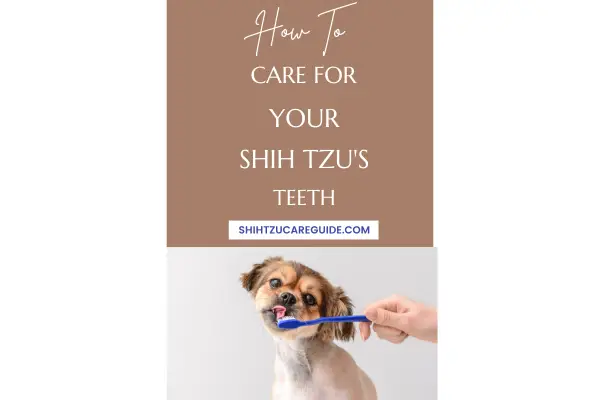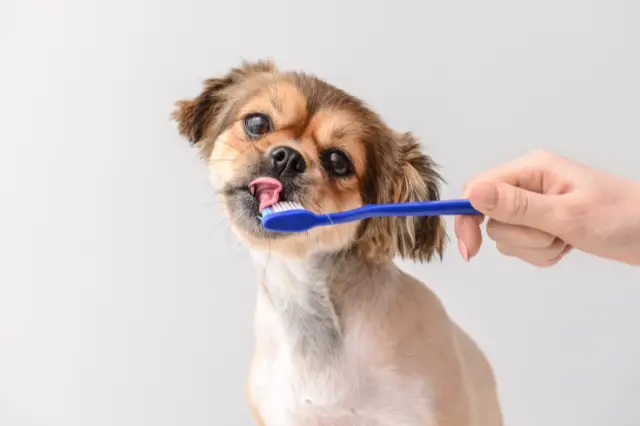Knowing how to care for your Shih Tzu’s teeth and practicing good dental hygiene is crucial for your Shih Tzu’s overall health and well-being. Just like humans, dogs are prone to dental issues such as plaque buildup, gum disease, and tooth decay.
The one thing most people forget about in taking care of their dogs is that their teeth also need to be taken care of.
We know that wild dogs keep their teeth free from plaque because they chew on raw bones, which are a natural scraper of the plaque that also helps to remove any soft meat that may get stuck in their teeth that would normally cause bacteria to grow rapidly.
You need to remember that your dog isn’t like a wild animal, he needs your help from the bacteria that causes bad breath and other problems.
By implementing a regular dental care routine, you can help prevent these problems and keep your Shih Tzu’s teeth and gums in excellent condition.
Let’s take a look at some valuable insights and practical tips on how to care for your Shih Tzu’s teeth, ensuring their dental health for years to come.
Affiliate Disclosure: This post contains Amazon affiliate links. This means I get a small commission for qualifying purchases made at no extra cost to our dear readers. Please read the disclaimer for more info.
1. Brushing Your Shih Tzu’s Teeth
Regular brushing is the foundation of proper dental care for your Shih Tzu.
Follow these steps to establish a tooth brushing routine:
1.1 Introduce Tooth Brushing Gradually.
Start by getting your Shih Tzu accustomed to having their teeth touched and their mouth handled. Use your finger or a soft cloth to gently rub their teeth and gums.
1.2 Choose the Right Toothbrush and Toothpaste.
Use a soft-bristled toothbrush specifically designed for dogs or a finger brush. Never use human toothpaste, as it can be toxic to dogs.
Instead, opt for toothpaste formulated for dogs. This one from Vet’s Best, comes with a toothbrush and is made with aloe, neem oil, grapefruit seed extract, baking soda and enzymes, which work together to help keep your dog’s mouth fresh and clean.
1.3 Brush Gently and Effectively.
Angle the toothbrush at a 45-degree angle and use small, circular motions to clean your Shih Tzu’s teeth and gumline. Focus on the outer surfaces as they are more prone to plaque buildup.
Gradually increase the brushing time until you reach about 2 minutes per session.
1.4 Make it a Positive Experience.
Reward your Shih Tzu with praise, or playtime after each successful brushing session to create a positive association with tooth brushing.
2. Provide Dental-Friendly Treats and Toys
Chewing is a natural behavior that can help maintain your Shih Tzu’s dental health.
Incorporate the following dental-friendly treats and toys into their routine:
2.1 Dental Chews.
Search for high-quality dental chews that are specifically designed to promote oral hygiene and made from natural ingredients. These chews are often textured to help remove plaque and tartar while your Shih Tzu enjoys a tasty treat.
2.2 Soup or Rawhide Bones.
It doesn’t have to be your soup bone, it could be a rawhide bone you can find in your local pet store. My girl loved these and are made with real chicken.
They’ll instinctively chew on the bone and the plaque can easily be scraped off and any soft meat that may be stuck between their teeth will get loosened up before any problems can occur.
2.3 Dental Toys.
Look for toys that are designed to promote chewing and help clean your dog’s teeth. These toys are typically made of rubber or nylon and have ridges or bristles that can help remove plaque.
3. Regular Dental Check-ups.
Regular veterinary dental check-ups are essential for identifying potential issues and maintaining your Shih Tzu’s oral health.

Your vet can perform professional cleanings, check for tooth decay or gum disease, and provide guidance on your Shih Tzu’s specific dental needs.
4. Healthy Diet for Dental Health.
Providing a balanced diet is crucial for your Shih Tzu’s overall health, including their dental well-being. Look for high-quality dog food that supports dental health.
Dry kibble dog food can help remove plaque from your Shih Tzu’s teeth while chewing. The kibble’s abrasive texture can help scrape away buildup.
Try to avoid sugary and sticky treats that can contribute to dental issues. Instead, offer dental-friendly treats or natural options like raw bones (under supervision).
Below are some common questions you may have regarding your Shih Tzu’s teeth.
How Many Teeth Should a Shih Tzu Have?
A Shih Tzu typically has 42 teeth, which is the same number of teeth as most other dog breeds.
These teeth include incisors, canines, premolars, and molars. Like all dogs, Shih Tzu’s have two sets of teeth during their lifetime.
They initially have a set of puppy teeth, also known as deciduous teeth, which are eventually replaced by their adult teeth.
When do Shih Tzu Teeth Fall Out?
Shih Tzu puppies, like most dogs, have a set of deciduous (baby) teeth that start to erupt when they are around 3 to 4 weeks old.
These baby teeth are gradually replaced by permanent teeth as the puppy grows. The process of the baby teeth falling out and the permanent teeth coming in is known as teething.
Typically, the baby teeth of a Shih Tzu puppy begin to fall out and are replaced by permanent teeth between the ages of 3 to 7 months.
However, every dog is different, and the timing may vary. Some puppies may lose their baby teeth earlier or later than the average timeframe.
It’s important to note that during the teething process, puppies may experience discomfort or pain, and they often chew on objects to alleviate it.
Providing appropriate chew toys and regular dental care can help promote healthy teeth and gums in Shih Tzu’s and alleviate any discomfort associated with teething.
If you have concerns about your specific Shih Tzu’s dental health or teething process, it’s always a good idea to consult with your veterinarian.
Why do Shih Tzu’s Teeth Stick Out?
Shih Tzu’s, like many other small dog breeds, can sometimes have teeth that appear to stick out.
There are a few reasons why this may occur:
1. Malocclusion
Malocclusion refers to a misalignment of the teeth. Shih Tzus, due to their brachycephalic (short-faced) nature, can sometimes have a condition called brachygnathism, where the lower jaw is shorter than the upper jaw.
This can result in a misalignment of the teeth, causing them to protrude or stick out.
2. Retained Deciduous (baby) Teeth
Shih Tzu’s, like all dogs, have baby teeth that are eventually replaced by their adult teeth. Sometimes, the baby teeth do not fall out as the adult teeth erupt, resulting in both sets of teeth occupying the same space. This can cause the teeth to stick out.
3. Dental Overcrowding
Shih Tzu’s have relatively small mouths and jaws compared to their teeth size. As a result, their teeth may be crowded together, leading to misalignment and protrusion.
It’s important to note that while some degree of dental misalignment or protrusion may be common in Shih Tzu’s, excessive or severe dental problems should be evaluated by a veterinarian.
Regular dental care, including professional cleanings and routine check-ups, can help identify and address any dental issues to ensure the overall health and well-being of your Shih Tzu.
Conclusion
Learning how to care for your Shih Tzu’s teeth is essential for their dental health and overall well-being. By following these tips, you can prevent dental problems, maintain a healthy smile, and ensure a happy and comfortable life for your furry friend.
It’s better to treat the teeth before things get out of hand and get more expensive for your pocketbook.
With consistent care and attention, you can keep your Shih Tzu’s teeth healthy and promote their overall oral health for years to come.


